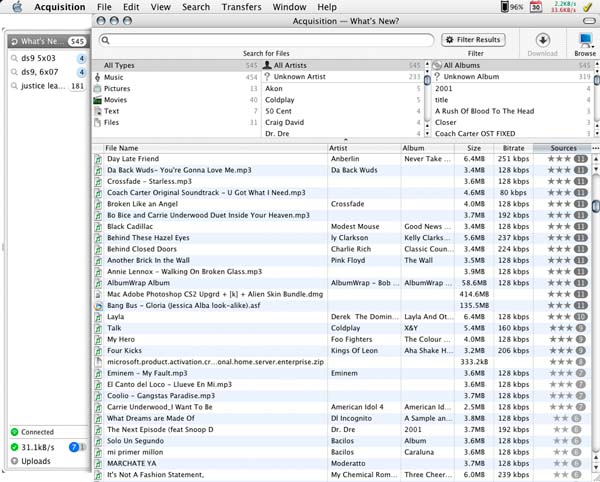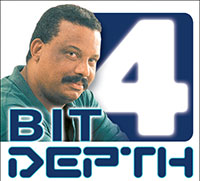BitDepth 480 - July 05
11/01/09 17:43 Filed in: BitDepth - July 2005
Legal action is clamping down on the free flow of copyrighted material on peer to peer networks.
Barriers between peers

Touch the zeitgeist of popular culture with a P2P application's "What's New" button. The rather directly named Acquisition lists what people are looking for on the Internet.
Last Monday's US Supreme Court decision that the creators of file sharing software can be held responsible for the copyright infringement their products enable hasn't had a chilling effect on the flow of illegal files yet.
On the popular peer to peer (P2P) networks, music, text files of well-known books, television episodes and movies were still moving, served by thousands of computers all over the world.
The Supreme Court ruling specifically names Grokster and Streamcast, but the precedent can easily be rolled out to challenge products such as Limewire and Kazaa, which also enable access to the hundreds of thousands of pirated works of intellectual property freely shared across the Internet.
P2P file sharing networks are created between personal computers on an ad hoc basis, instead of the traditional and structured client-server networks that form the basis of most Internet and office network connectivity.
Napster, the first network of peers to attract the attention of litigious music producers, went under because its index of servers and offerings (which made it the most successful P2P network ever created) implicated it in the illegal activity that proliferated using its software.
Not offering actual files wasn't enough of a defence, because prosecutors proved that Napster's system made access to files easier by intervening in the process by creating the indexes.
After Napster's crash, the networks that sprang up to take its place learned their lesson.
The Gnutella (common client: Limewire) and FastTrack (favored client: Kazaa) networks link computers that offer files with computers that are searching for them, but they do so in a hands-off manner, but transfers are much slower and an uncommon file is difficult.
Each client of these networks can also be a server, allowing people using the software to search for files even as they offer their own collections. With no indexes, downloading became more frustrating, with downloads stalling when providers left the network.
Coming to the rescue was a significant increase in broadband access worldwide that made faster connections possible, but the files were now spread across different and incompatible networks and would never again match Napster's reach.
Now that intellectual property owners in the US have a Supreme Court ruling on their side, organisations like the RIAA and the MPAA are likely to increase their surveillance and investigation of these networks.
But many of these files are being shared from computer outside the United States, and the Supreme Court's decision means little to P2P users outside the US.
In Trinidad, there's a growing trend for small entrepreneurs to throw up a shingle, often it's really just a scrappy sign, and offer movies for sale at TT$20 per DVD.
Some of these movies are copies of commercial DVDs, but many of them are duplicates of the "screeners" that fueled the VHS video rental business.
A growing number of these budget DVDs, particularly those of films still in local cinemas or due soon are reconstituted from movies downloaded from P2P networks, many served from European countries unconcerned about young people sneaking into cinemas with digital video minicams.
Complicating matters, the Supreme Court ruling itself seems more like guidance than law, and intent plays a big part in the language of the findings.
Justice David H Souter wrote: "The record is replete with evidence that from the moment Grokster and Streamcast began to distribute their free software, each one clearly voiced the objective that recipients use it to download copyrighted works, and each took active steps to encourage infringement."
While Apple's iTunes and its hardware companion the iPod surely ferry some unlawfully acquired files among the millions of music lovers using the devices, Apple warns users against music piracy in their packaging. Such warnings may become more visible in new versions of P2P software.
With the Grokster/Streamcast case returned to lower court, US-based filesharing is certain to become more circumspect, but that only drives the problem underground, and will only create digital-era music prohibition speakeasies.
The brutal truth is that music and movie distribution channels have changed and changed quickly. Apple's iTunes Music Store provides some countries with a legal way to listen to digital music that's proven to be wildly successful, but the movie industry still hasn't found a way to route the enthusiastic traffic in television shows and current movies to profit centres.
That's going to be the real challenge, not hunting down petty thieves guilty of using technology to satisfy their cravings.

Touch the zeitgeist of popular culture with a P2P application's "What's New" button. The rather directly named Acquisition lists what people are looking for on the Internet.
Last Monday's US Supreme Court decision that the creators of file sharing software can be held responsible for the copyright infringement their products enable hasn't had a chilling effect on the flow of illegal files yet.
On the popular peer to peer (P2P) networks, music, text files of well-known books, television episodes and movies were still moving, served by thousands of computers all over the world.
The Supreme Court ruling specifically names Grokster and Streamcast, but the precedent can easily be rolled out to challenge products such as Limewire and Kazaa, which also enable access to the hundreds of thousands of pirated works of intellectual property freely shared across the Internet.
P2P file sharing networks are created between personal computers on an ad hoc basis, instead of the traditional and structured client-server networks that form the basis of most Internet and office network connectivity.
Napster, the first network of peers to attract the attention of litigious music producers, went under because its index of servers and offerings (which made it the most successful P2P network ever created) implicated it in the illegal activity that proliferated using its software.
Not offering actual files wasn't enough of a defence, because prosecutors proved that Napster's system made access to files easier by intervening in the process by creating the indexes.
After Napster's crash, the networks that sprang up to take its place learned their lesson.
The Gnutella (common client: Limewire) and FastTrack (favored client: Kazaa) networks link computers that offer files with computers that are searching for them, but they do so in a hands-off manner, but transfers are much slower and an uncommon file is difficult.
Each client of these networks can also be a server, allowing people using the software to search for files even as they offer their own collections. With no indexes, downloading became more frustrating, with downloads stalling when providers left the network.
Coming to the rescue was a significant increase in broadband access worldwide that made faster connections possible, but the files were now spread across different and incompatible networks and would never again match Napster's reach.
Now that intellectual property owners in the US have a Supreme Court ruling on their side, organisations like the RIAA and the MPAA are likely to increase their surveillance and investigation of these networks.
But many of these files are being shared from computer outside the United States, and the Supreme Court's decision means little to P2P users outside the US.
In Trinidad, there's a growing trend for small entrepreneurs to throw up a shingle, often it's really just a scrappy sign, and offer movies for sale at TT$20 per DVD.
Some of these movies are copies of commercial DVDs, but many of them are duplicates of the "screeners" that fueled the VHS video rental business.
A growing number of these budget DVDs, particularly those of films still in local cinemas or due soon are reconstituted from movies downloaded from P2P networks, many served from European countries unconcerned about young people sneaking into cinemas with digital video minicams.
Complicating matters, the Supreme Court ruling itself seems more like guidance than law, and intent plays a big part in the language of the findings.
Justice David H Souter wrote: "The record is replete with evidence that from the moment Grokster and Streamcast began to distribute their free software, each one clearly voiced the objective that recipients use it to download copyrighted works, and each took active steps to encourage infringement."
While Apple's iTunes and its hardware companion the iPod surely ferry some unlawfully acquired files among the millions of music lovers using the devices, Apple warns users against music piracy in their packaging. Such warnings may become more visible in new versions of P2P software.
With the Grokster/Streamcast case returned to lower court, US-based filesharing is certain to become more circumspect, but that only drives the problem underground, and will only create digital-era music prohibition speakeasies.
The brutal truth is that music and movie distribution channels have changed and changed quickly. Apple's iTunes Music Store provides some countries with a legal way to listen to digital music that's proven to be wildly successful, but the movie industry still hasn't found a way to route the enthusiastic traffic in television shows and current movies to profit centres.
That's going to be the real challenge, not hunting down petty thieves guilty of using technology to satisfy their cravings.
blog comments powered by Disqus

